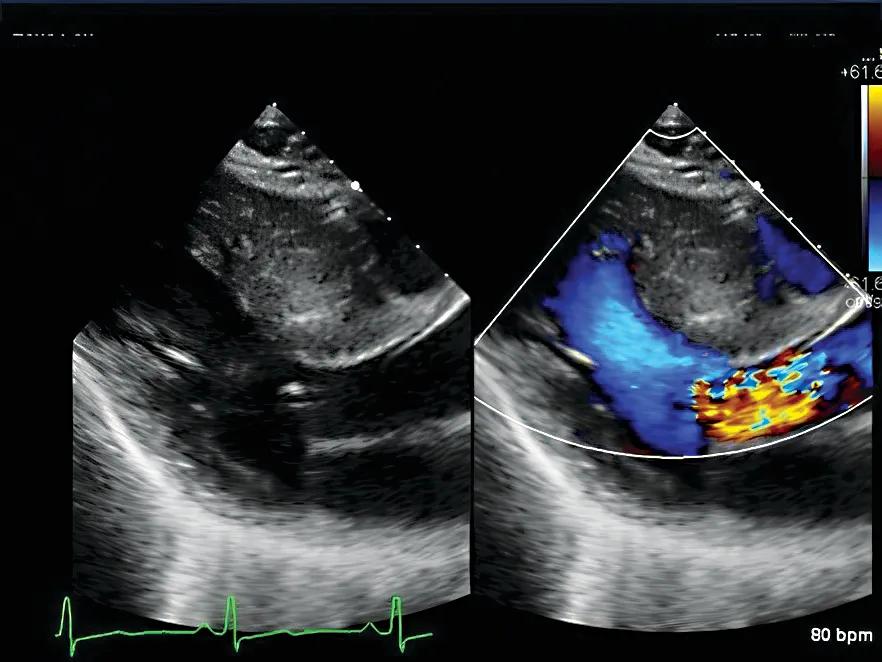
By Craig Asher, MD, cardiologist with Cleveland Clinic Weston Hospital and Director of the Hypertrophic Cardiomyopathy Center
Note: This article is reprinted from Cardiac Care: An Update for Physicians from the Heart, Vascular and Thoracic Institute (Spring 2024)
Advertisement
Cleveland Clinic is a non-profit academic medical center. Advertising on our site helps support our mission. We do not endorse non-Cleveland Clinic products or services. Policy
Hypertrophic cardiomyopathy (HCM), one of the most common forms of cardiomyopathy, is a condition in which the heart thickens inappropriately. Historically, the prevalence of HCM has been cited as 1 in 500 individuals. More recently, however, based on gene tests, family screening and early detection with cardiac imaging, it is now estimated to occur more frequently, in 1 in 200 individuals. HCM occurs equally in males and females, is found in all racial and ethnic groups, and has been detected at all ages from children to the elderly. It is found in most parts of the world.
While most patients with HCM have a good quality of life and life expectancy, a wide spectrum of clinical presentations may occur. Because of increased thickness of the heart muscle, heart failure symptoms may develop due to obstruction of blood exiting the heart or from resistance to blood flow entering the heart. In addition, there may be electrical disturbances with HCM that lead to heart rhythm abnormalities including atrial and ventricular arrhythmias and, less commonly, sudden cardiac death.
The four pillars of care for patients with HCM are to 1) treat or prevent symptoms or cardiac events; 2) facilitate and ensure family screening; 3) stratify for risk of sudden cardiac death; and 4) provide education, support and resources regarding their condition.
Although many patients with HCM will require no medical therapy, symptomatic patients are treated with medications like beta-blockers, which may provide relief. Since April 2022, a new disease-specific class of medication (mavacamten, a cardiac myosin inhibitor) was approved for use for the obstructive form of HCM.
Advertisement
One of the two landmark trials that studied mavacamten, the VALOR-HCM trial, was led by investigators at Cleveland Clinic’s main campus. With this medication, approximately 80% of patients who were eligible for HCM heart surgery (myectomy), no longer required an operation. Surgical myectomy still remains a time-tested definitive option for managing obstructive HCM, and Cleveland Clinic surgeons in Cleveland and Florida are among a small group of surgeons who have pioneered this operation and perform high volumes.
For all patients with HCM, even for those without symptoms, it is important to have a comprehensive evaluation. This usually requires a complete personal and family history, physical examination, electrocardiogram (EKG), echocardiogram and stress echocardiogram, rhythm monitor and, sometimes, genetic testing and a cardiac MRI. Family screening can be done with interval EKGs and echocardiograms or with gene testing guided by a genetic counselor.
Discussions about lifestyle, exercise and the do’s and don’ts of living with HCM are a key aspect of education and patient well-being. Several organizations, including the Hypertrophic Cardiomyopathy Association (HCMA), are excellent resources committed to providing education and advocacy to HCM patients and family members.
A final critical aspect of HCM care involves the assessment of risk for dangerous heart rhythm problems including sudden cardiac death. A complete battery of tests is often required to make this assessment. There are algorithms and calculators developed by the American Heart Association/American College of Cardiology and European Society of Cardiology to aid in this determination. However, shared decision-making between patients and physicians is essential to determine which patients may ultimately benefit from prophylactic therapy with an implantable cardiac defibrillator.
Advertisement
Cleveland Clinic Weston Hospital is one of Florida’s leading referral centers for HCM care. We offer a multidisciplinary specialty group with experience in the diagnosis, management and surgery for HCM. Our team utilizes advanced imaging technologies, genetic testing, traditional and clinical research treatment options and cardiac surgeons specialized in HCM surgery. Weston Hospital’s Hypertrophic Cardiomyopathy Center is recognized as one of two HCM Centers of Excellence in the state of Florida, as designated by the HCMA, with approximately 50 designated centers in the United States.
Dr. Asher is a cardiologist with Cleveland Clinic Weston Hospital and Director of the Hypertrophic Cardiomyopathy Center.
Advertisement
Advertisement

Nonthermal technique reduces bleeding and perforation risk

Standardizing a minimally invasive approach for Barrett’s Esophagus and Esophageal Cancer

PSMA-targeted therapy for metastatic prostate cancer now offered at Cleveland Clinic Weston Hospital

Nationally recognized urologic oncologist offers vision for growth, innovation, and excellence

Noninvasive modality gains ground in United States for patients with early-to-moderate disease

Cleveland Clinic Weston Hospital’s collaborative model elevates care for complex lung diseases

Interventional pulmonologists at Cleveland Clinic Indian River Hospital use robotic technology to reach small peripheral lung nodules

Trained in the use of multiple focal therapies for prostate cancer, Dr. Jamil Syed recommends HIFU for certain patients with intermediate-risk prostate cancer, especially individuals with small, well-defined tumors localized to the lateral and posterior regions of the gland.